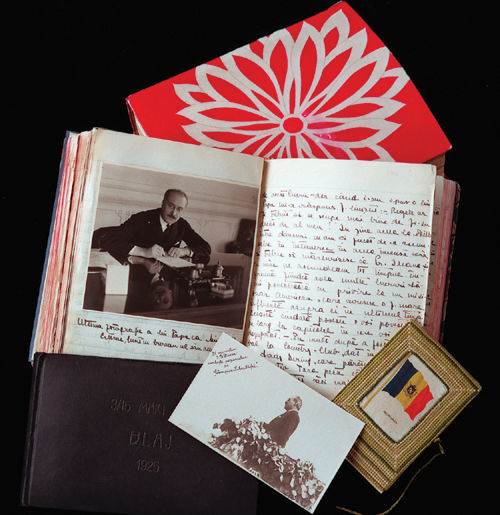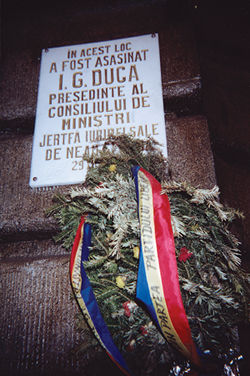Ion G. Duca, 1879–1933, Romanian Political Leader
 |
|
5. Ion G. Duca was a leader of the National Liberal Party, which represented Romania’s industrial and financial middle class. Between 1909 and 1947 the party played a crucial role in modernizing Romania’s economy and converting its political system into a constitutional monarchy. The National Liberal Party adopted agrarian reform and an eight-hour workday, and helped consolidate Romania’s unification with Transylvania following World War I. Ion Duca held a wide variety of governmental posts before becoming prime minister in 1933. He and his political circle actively opposed the extremist trends threatening Europe. The Romanian Communist Party was outlawed in 1924. In 1933 Prime Minister Duca and the council of ministers ordered measures to outlaw the fascist Iron Guard, a terrorist organization linked with the Nazis. In retaliation, on December 31, 1933, three members of the Iron Guard waited for him at the train station outside the royal family’s resort at Sinaia, where Duca had been meeting with King Carol II. The three men assassinated Duca on the train platform. The photocollage depicts various souvenirs from Ion Duca’s career. Despite holding a series of senior administrative posts in the council of ministers, Duca found time to write a lengthy memoir describing the Romanian experience in World War I and thus a firsthand account of a turning point in the country’s history. The National Liberal Party tried to pursue a policy of neutrality as long as possible. When time ran out, it supported the decision to rescind an earlier alliance with Germany and Austria, and Romania entered the war in 1916 on the side of the British, French, and Russians. The decision precipitated enormous hardships. The country was overrun by Austro-German forces, and the government was forced to evacuate Bucharest. National treasures such as ancient gold archeological finds, the legendary royal jewels, and the most valuable state archives were entrusted to the Romanovs for safekeeping. The Bolshevik revolution a year later plunged Romania deeper into crisis as Russia withdrew its support. The Romanian crown jewels were never recovered. |
 |
6. With the fall of communism, prewar leaders and old traditions are again being honored. A white and gold marble plaque has been placed at the train station platform in Sinaia to commemorate Ion Duca’s fate. The wreath in this photograph was left on behalf of the National Liberal Party, which was revived after Romania’s 1989 revolution. |
|
|
|







